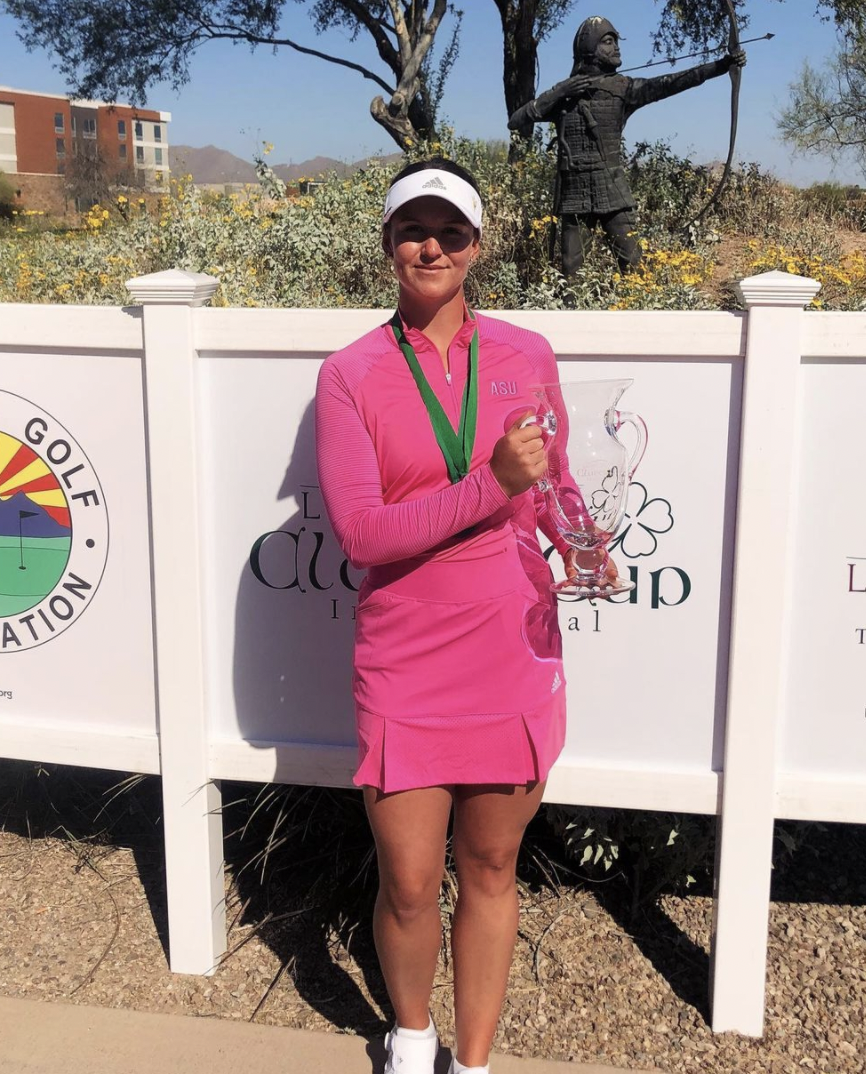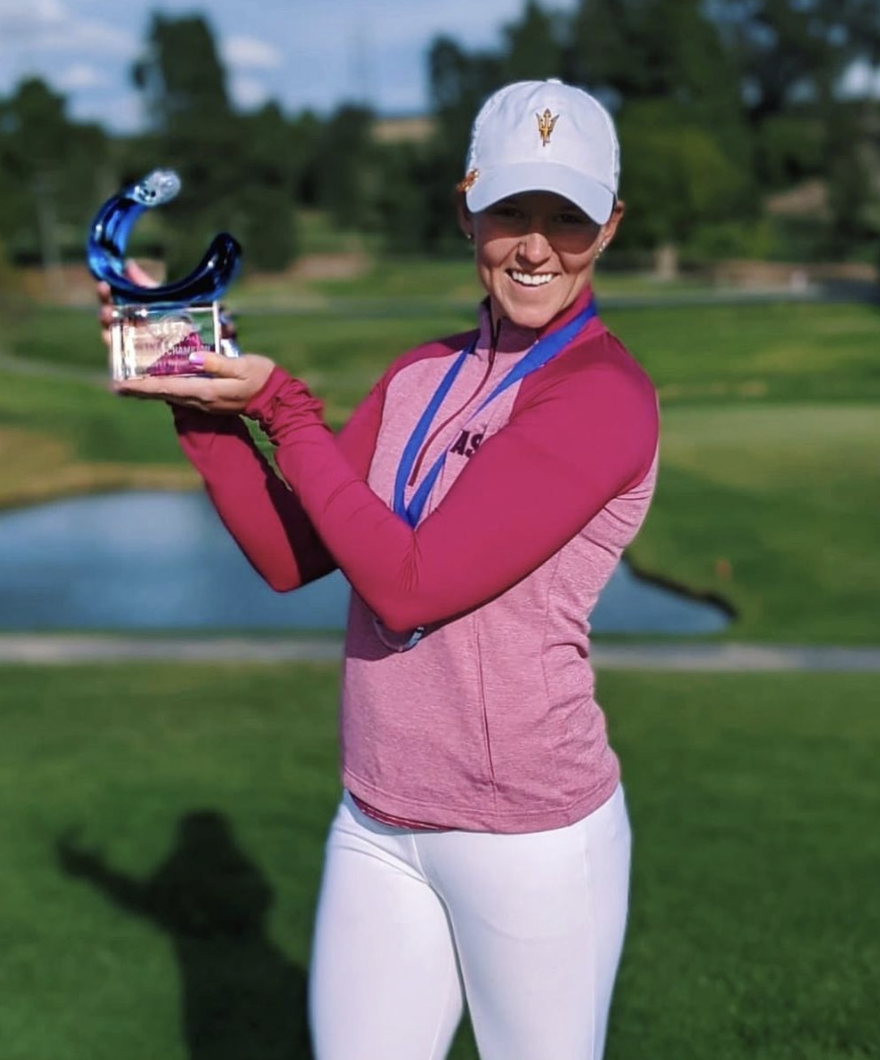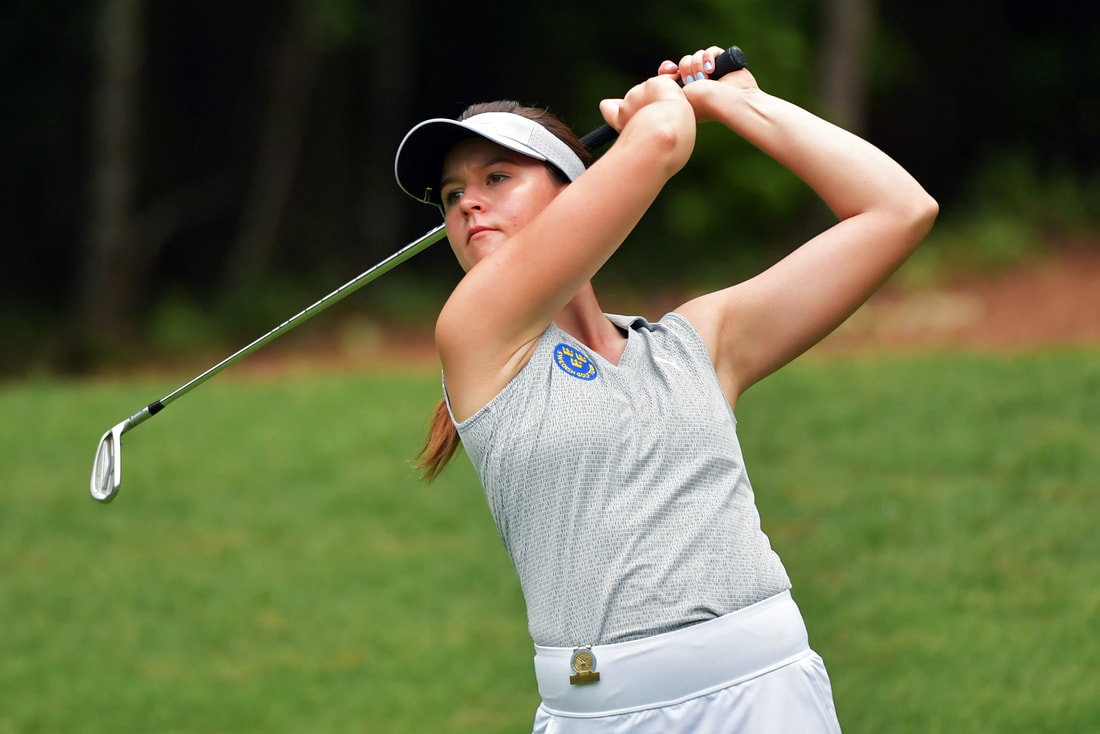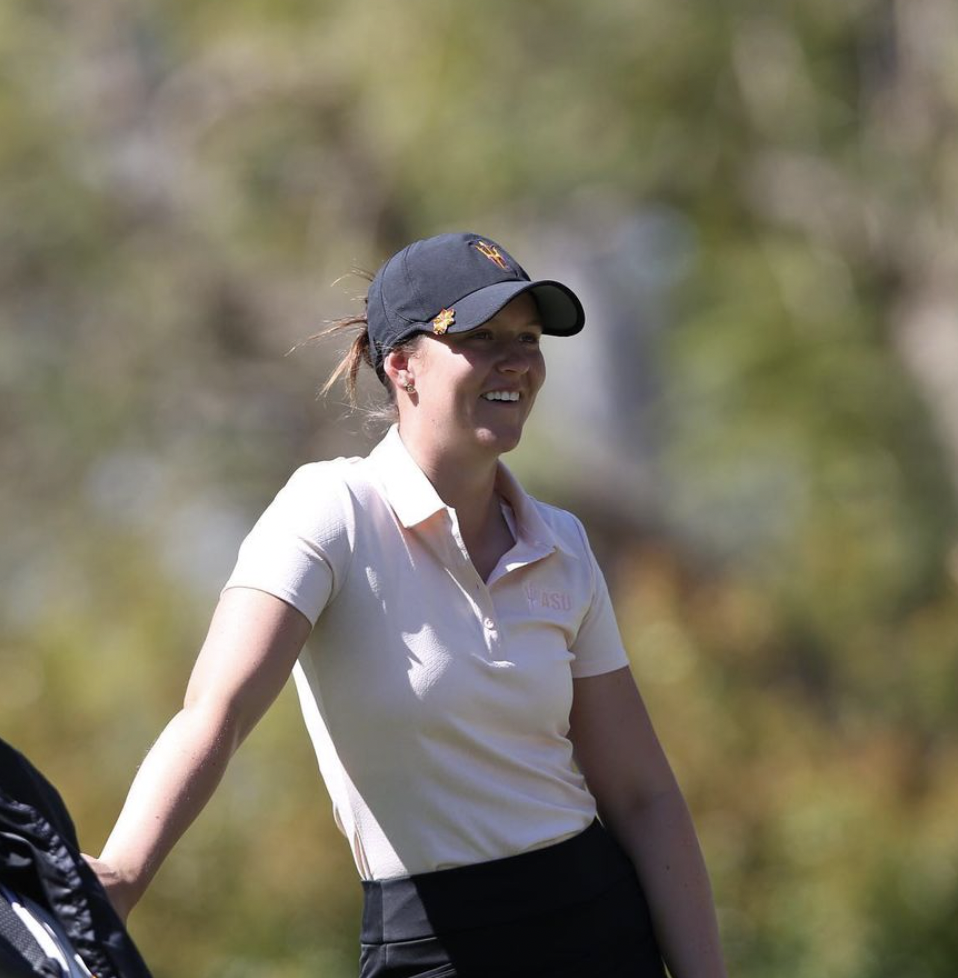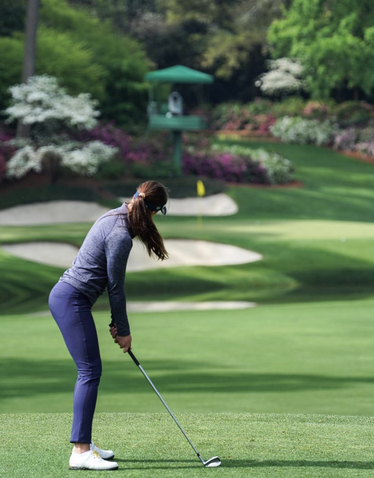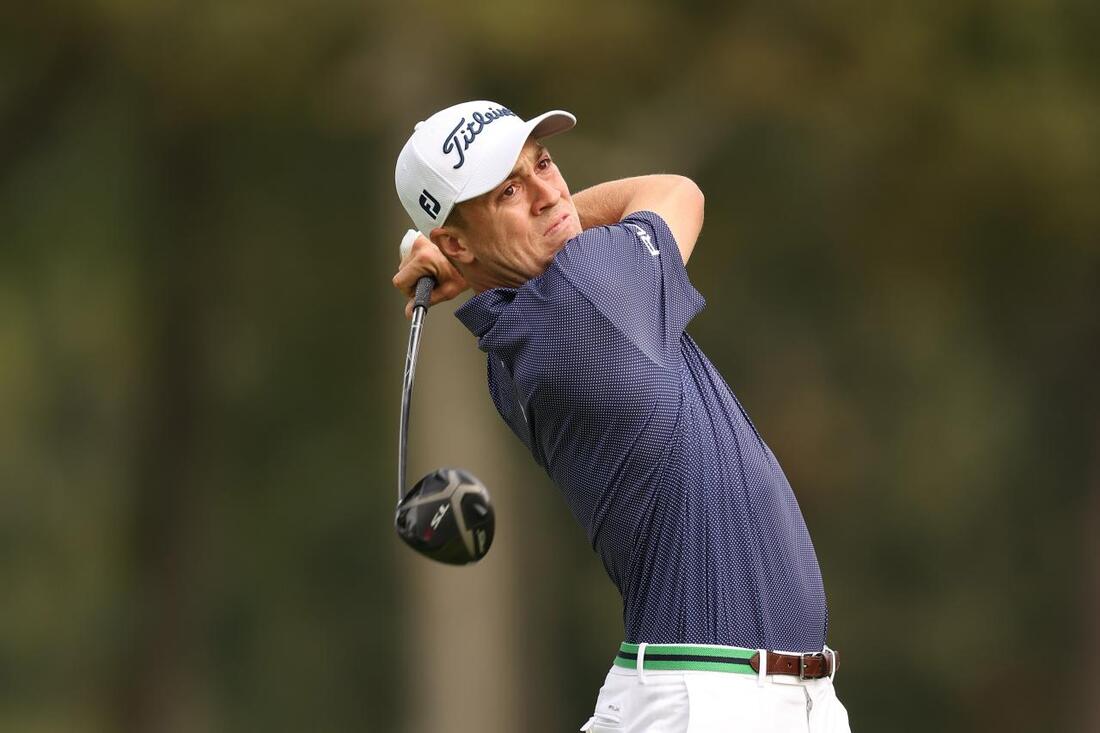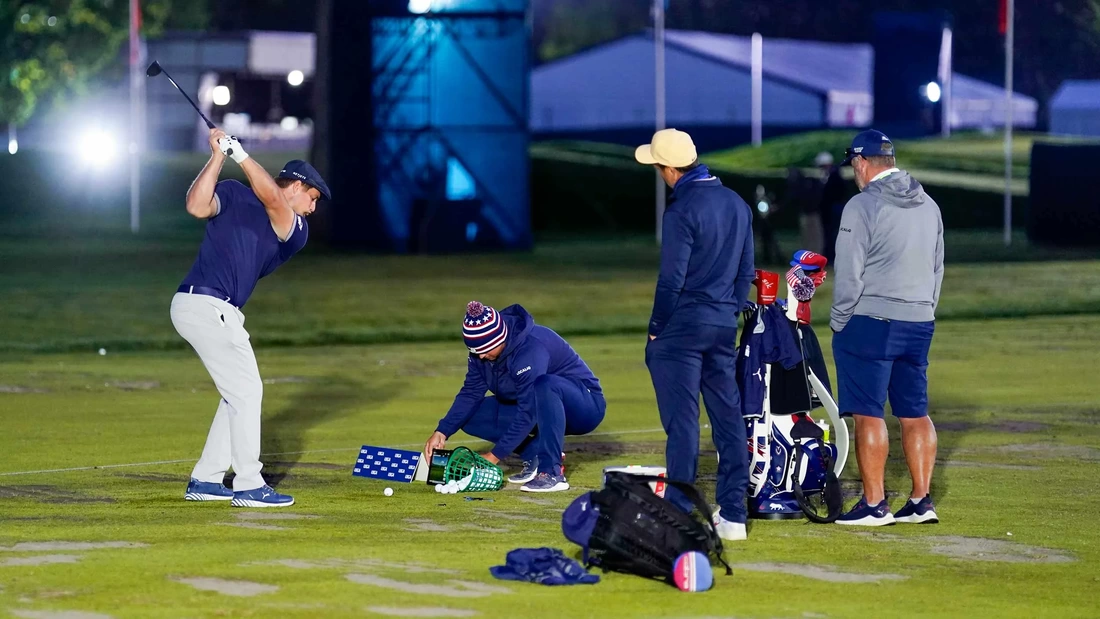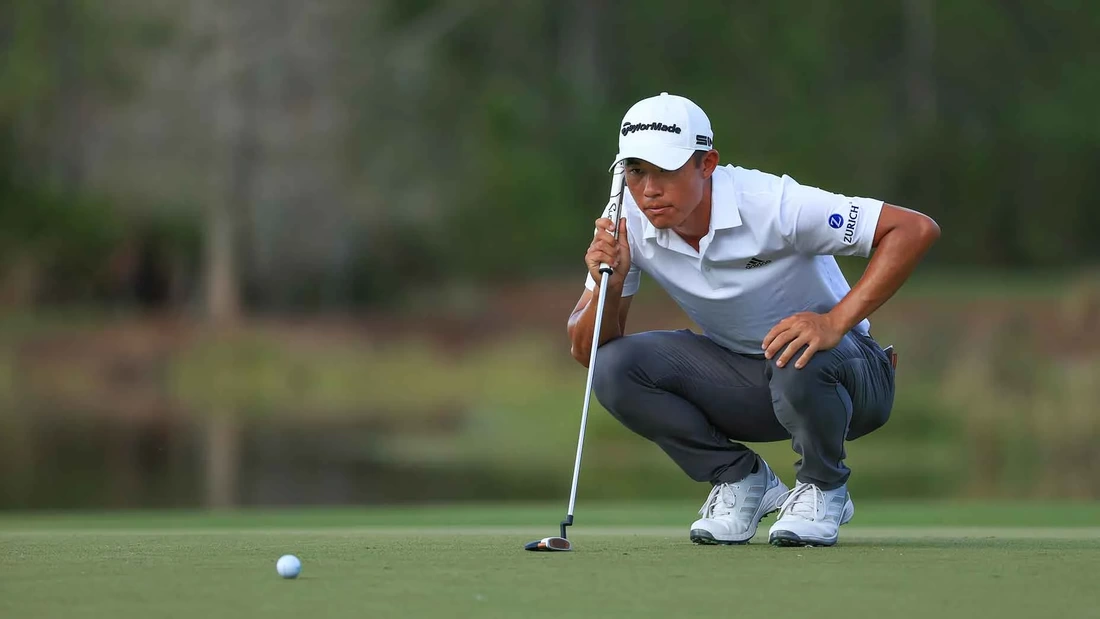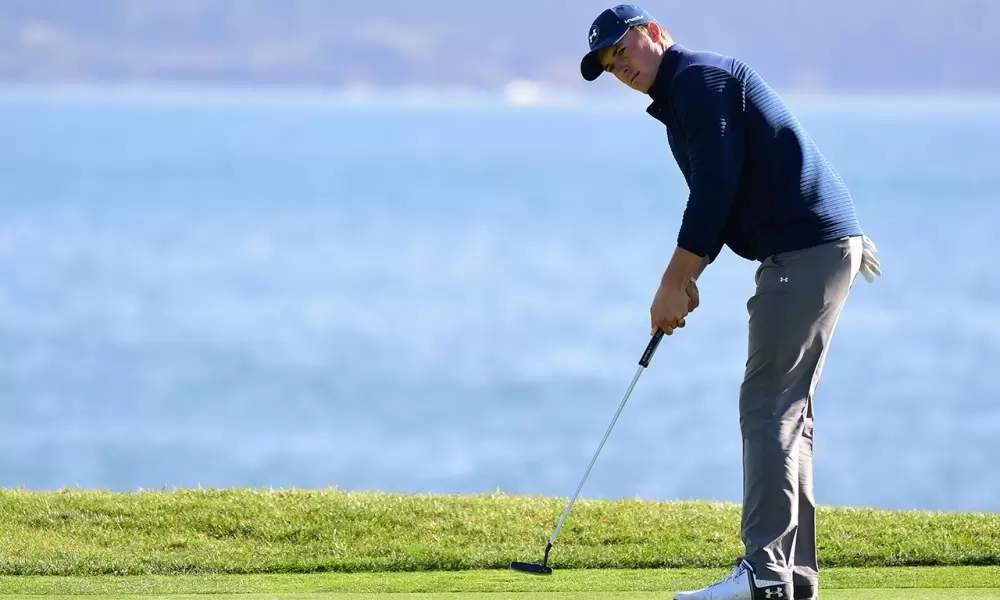|
Alex Elias John Bierkan serves as the Director of Instruction at Aronimink Golf Club (Newtown Square, PA) and Old Marsh Golf Club (Palm Beach Gardens, Florida). Bierkan was named Philadelphia PGA Teacher of the Year in 2014 and 2018. Additionally, he has been on Golf Digest's list of "America's Best Young Teachers" every year between 2010 and 2017. John Bierkan played Division 1 Golf at the University of Connecticut, and over his years as a player and now an instructor, Bierkan explained, "All golfers quite candidly, but particularly club players would definitely benefit from spending more time on short game." Bierkan continued, "The best way to improve your putting statistics is to hit it closer. Most tour players are really good around the green: chipping, pitching, green side bunkers and by club players working on that they're going to see more results in terms of those shots being closer to the hole and then statistically improving their odds to make a putt to save par."
While Bierkan's comments on short game are just one example, Bierkan said, "Maybe I'm biased but people need to make more time to practice in general." Bierkan continued, "If you look at any other sport or activity, people get better by taking lots of lessons and/or spending time practicing. For example: piano, karate, ice hockey, learning a foreign language, but for some reason golfers think you can go take one or two lessons and be cured or just magically hit the ball better. You don't do that when you're learning how to skate, you don't do that when you're learning piano. I just think for some reason people don't equate learning or practicing golf to any other skill in life." Although Bierkan played collegiate golf and is now a golf instructor, Bierkan knows just what it's like to learn a new sport. Over the last three years, Bierkan has begin playing hockey and he said, "My first winter with lessons down here [Florida], I took approximately 120 hours. The next winter, I had taken 148 hours. This winter, this morning, was my 127th hour of hockey lessons. I'm not saying this to brag, but my point is, being a teacher and an instructor, I understand I'm not going to go from zero to sixty in ten hours of lessons. I want to practice what I preach." There is no denying that golfers have a desire to score well, but Bierkan said, "It inhibits the improvement process. You see this in club players, where they shot ninety-five yesterday and think they're miraculously going to hit the ball better and shoot eighty-five after one lesson. You have to put in the practice to train your swing. It can take five-hundred reps for some people, and two-thousand for others, but people can certainly get caught up in the immediate results rather than the plan." While the time and energy spent practicing is the most important aspect of learning a new sport, being honest with yourself is a close second. Bierkan said, "If a player comes and I'm trying to do something that I believe will help them with ball striking or accuracy, most people don't commit to swing changes because they say it feels weird." Bierkan continued, "If you change the way you move or do something, then yes, it's going to feel weird or awkward at first, but you have to put in the time and effort for it to feel normal so that you can trust the process. Trusting the process of getting better is extremely important."
0 Comments
Alex Elias Building on her incredibly impressive Freshman year, where Grant finished in the top ten in five of seven events and was named a Women's Golf Coaches Association (WGCA) All-American, Grant has has now won four tournaments in a row, and isn't showing any signs of slowing down. Currently, Grant is the second ranked women's amateur according to the World Amateur Golf Ranking. Prior to ASU, Grant represented Sweden at the European Girls' Team Championship, finishing runner-up in 2016 and winning in 2017. Additionally, Grant won the German Girl's Open, the Scottish Women's Championship and was a medalist at the U.S. Women's Open Sectional Qualifying, earning her a spot in the 2018 U.S. Open. At the 2018 U.S. Open at Shoal Creek Club (Shoal Creek, Alabama), Grant began Round 3 tied for fourth, before finishing fifty-seventh. Reflecting on playing in a U.S. Open as an amateur, Grant said, "Especially the U.S. Open, that's a special tournament for everyone, I kind of have to look at it from a bigger perspective than just that tournament. As competitive as most golfers are, we all want to win even if we know the odds are very small, but just knowing what I gained from that week and what I've learned from that tournament is more important than the place I ended up with." There is no denying that Grant is one of the most accomplished collegiate golfers of all time, but even the best in the world know what it's like to struggle on any given hole. When asked about her mindset when struggling, Grant responded, "Even during a good round, you can have three bad holes in a row, where you're like 'Where am I going?' I would just tell myself that I need to get back to the basics, like the basics of how do I get back to a good, decent score. For me, that would be to just go back to my routine, and just try to hit the fairways so when I do that, I can leave that behind and just focus on the next shot." Grant continued, "Instead of being aggressive and going for the pins because that's often what happens, you're getting stressed because you're playing poorly, but you end up in worse positions. I don't necessarily hit to the safe spots, but I hit so I know the worst thing that can happen is a par." As a result of her stellar freshman campaign, Grant was selected to represent Team Europe at the 2020 Palmer Cup. Grant said, "Palmer Cup is just such a fun week. When we played in Europe, we all played for different countries and against each other, then coming here we all play for different schools so for once to actually play together was a new but great experience." Grant continued, "I try to represent Sweden all the time, but to be able to represent Europe and know you are one of the best players from your continent is really special." As Grant has already accomplished many of her goals, including playing in the the Augusta National Women's Amateur, Grant's goals only continue to grow. Grant said, "I try to not think about how much I want to earn or how many wins I want to win, but Solheim Cup would be a dream come to true. To be able to play on the LPGA and have that as my job, and be successful is my goal. To win a major is one of my big goals." In regards to her personal goals, Grant said, "To be able to have my family around a lot. I want to be able to bring them with me on tour and have a good life on tour."
Alex Elias Katie Wiedmar is the Golf Shop Manager and First Assistant Golf Professional at Winged Foot Golf Club in Mamaroneck, New York. Winged Foot hosted the 2020 U.S. Open and is the eleventh ranked course in the United States, according to Golf Digest. On April 6th, 2020, the U.S. Open at Winged Foot Golf Club in Mamaroneck, New York, originally scheduled for June 18-21, was rescheduled to September 17-20, as a result of COVID-19. Katie Wiedmar said, "We were notified several years before that we would be hosting the U.S. Open, and obviously at the time no one knew about COVID. We planned for a normal U.S. Open, attending several meetings, and actually went to the 2017 U.S. Open at Shinnecock to meet with the USGA." Wiedmar continued, "With us in the shop, we started carrying the U.S. Open merchandise around Christmas of 2017. Then, each year we continued bringing in more merchandise. Definitely a lot of planning goes into that one week of championship golf and it all kind of changed when COVID happened." Around the same time the U.S. Open announced the tournaments rescheduling, The R&A announced the cancellation of The Open Championship. While it was great to be hopeful for a September U.S. Open, there was no guarantee the tournament would take place. Wiedmar said, "We saw every sporting event getting cancelled and postponed so we were nervous that we weren't even going to have the tournament. All these years of hard work, seeing it go away was pretty depressing." Fortunately for Winged Foot, the U.S. Open was able to be played in September. Wiedmar reflected on the U.S. Open saying, "We were very thankful when it was just postponed, and not canceled. Obviously, it was a much more scaled down version of the U.S. Open. We weren't able to have the corporate hospitality tents, or the spectators, or the thousands of people that would regularly be here. It was mainly staff, member volunteers, and players and caddies." After the first round, twenty-one players posted a sub-par score and Justin Thomas recorded a five-under 65, the lowest U.S. Open round ever at Winged Foot. The results were incredibly shocking and Wiedmar said, "Being a spectator at the 2017 U.S. Open, you could see how frustrated the players were and how they deemed it unfair at times. With us having the U.S. Open, I think the USGA made a more conscious effort to make it more fair, which was shown in that first round, where the scores were much lower than anyone had anticipated." As a result of the lower than anticipated scores, prior to the second round, concerns were voiced. Wiedmar said, "Our superintendent kind of voiced his concerns and we were able to make the course more like what we are used to playing day in and day out. The golf course is hard at all times for the members and to see it, where the greens weren't as fast, it was a little surprising." During the week of the U.S. Open, Katie Wiedmar was in charge of the driving range operation. Prior the final round, Bryson DeChambeau was seen on the range working late into the evening. Wiedmar said, "Two or three nights in a row, Bryson was the last one to leave the range. On Saturday night, I was actually in the golf picker, with the lights on, just following wherever he hit it and picking up that single ball every thirty seconds. We definitely waited on him a couple nights, but obviously it worked out well for him." DeChambeau won the 2020 U.S. Open, finishing six under, as the only player under par. Wiedmar commented on DeChambeau's win saying, "His putting was outrageous. He had the whole package. He had a couple breaks go his way, and his whole play regardless of what course he played that week, he was going to win. He was dialed in and proved to be the right champion."
Alex Elias James Nicholas graduated from Yale University in 2019, earning Ivy League Player of the Year twice (2018, 2019). Nicholas graduated with an Ecology and Evolutionary Biology degree, and between his studies and practice, learned how to manage his time at a very young age. Nicholas said, "My best asset as a golfer, a person and a student is managing my time. In college, you have to allocate time to study, practice and hang out with friends and starting in college, I started writing down a schedule every night before I went to bed." While Nicholas' schedule is extremely detailed, it is continuously fluctuating. Nicholas said, "The free time in the afternoon is always extra time. Whatever I'm doing poorly, I'm going to work two hours more on." With that said, there are certainly some similarities, as Nicholas continued, "It's very similar day to day because I have the core things I want to work on, whether it be speed, starting lines, but then I'll edit it based on how my body is feeling that day, how much sleep I got the night before or if I have a tournament coming up." Being from Scarsdale, New York, Nicholas is most likely not a Tom Brady fan, but Tom House once said, "Tom [Brady] and these other elite quarterbacks don't come in here to get 5% better, they come to get 1% better." As Nicholas detailed his practice routine, he was asked about House's comment and said, "If I could get 10% better in a day, then I wouldn't be on the Korn Ferry Tour. It's about getting that fraction of a percent better every single day." Nicholas went on to say that when people ask him how long he'll play golf for, he responds, "I'll play for as long as I get better. If I'm getting better every single day, then I'll play until I'm dead." While practicing each day certainly helps one's development, attention to detail can be just as beneficial. As Nicholas transitioned from college to his professional career, he made sure to watch and learn from his fellow competitors. Nicholas said, "I learn a lot from my peers, guys like Brandon Wu and Max Greyserman have been doing this entire lives, while I got into the golf game a little later than they did. To be able to pick up mindset stuff, practice stuff, and recovery stuff is very valuable." Nicholas continued, "For example, I use Normatec all the time to recover and that is something Brandon Wu uses after every round. For me to grab that little piece from him is huge. To have fresh legs during a four-round event is huge. Another example would be a guy like Michael Miller who's a veteran. He told me he always plays his practice round Wednesday afternoon to follow a routine. Little things like that keep me getting better everyday."
As Nicholas nears his first event of the season, he highlighted his mindset during events. Nicholas said, "When I'm playing well, I have to stay aggressive. If I get to three or four under, then it can't stop there. I can't begin playing safe. I have to keep going because I know I'm playing well. On the other hand, if you're not playing too well, then it may not be too smart to go for a drivable par-4. I think knowing where your games stands for that day is really important." Nicholas reflected on two separate collegiate events saying, "I remember playing in the Macdonald Cup, when I broke the Yale scoring record, and my game was horrible going into the week, but that range that morning I started hitting it great. I played great in the first round and that gave me the confidence to go after every pin. On the other, I remember playing a Wake Forest event and was leading the event, but didn't feel sharp. The next day, I went out firing at all these pins and begun getting penalized." Through both experiences, Nicholas expressed how important it is to know your game saying, "Knowing your game and being able change how you're playing based how you're playing is extremely important. I think that's what golf always comes down to: knowing what you do well and sticking to it." Alex Elias David Wilson is the Head Golf Professional at Hyannisport Club in Hyannis Port, Massachusetts. David Wilson has served as the Head Golf Professional at Hyannisport Club for four years and said, "People always want to work on their full swing. When someone wants to work on their putting or short game, I'm like a kid in a candy store. I love that." Wilson was born in Quincy, Massachusetts and short game was instilled in him, at a young age. Wilson said, "I grew up playing Furnace Brook. It's a nine hole course, not even 6,000 yards when you play it twice. There's no range and because of that I grew up around putting greens. As a kid, all I did was putt and chip all day long." As a result, Wilson values short game and understands the importance of it saying, "You score around the greens. I think that's where amateurs can probably get the most out of their game, by just cleaning up a few things around the green." How Can Amateurs Improve Their Putting? Golfers often times get in a habit of working on the range, but do not spend nearly enough time putting. Wilson said, "I don't feel like most amateurs have enough structure on the putting green. What I mean by that is they'll kind of walk over, drop three balls, putt towards a hole and maybe do that again once or twice, but they don't have a routine to follow to get speed dialed in for that day." Wilson continued, "I think speed to an extent, it's a combination of speed and direction, but I think speed is the probably the number one thing amateurs could get a grasp on. If they had a routine when they got over to the putting green prior to a round, they'd eliminate a few three putts right away." In regards to particular advice, Wilson said, "When I first get out to a putting green, I may not necessarily even putt to a hole. I'll just putt a ball and try and hit the second one as close as I possibly can to the first, just so I can see if I can replicate the speed. It allows me to see how my feel is for that day and if I can duplicate that feel. From there, I think putting uphill, downhill is crucial. You always need a balance and that goes for breaking putts, as well. You want to make sure you have an opportunity to hit a left to right and a right to left putt." Last week, Collin Morikawa won the WGC - Workday Championship at The Concession. Prior to his win, Morikawa ranked outside the top two hundred in strokes gained putting, but may have found success with his new grip. Morikawa recently changed his putting grip to the "claw grip" and said, "My putting has never felt this good, and whether I make or miss putts, knowing that my stroke is good, line-wise, tempo, that's all that matters." Although Morikawa's putting was exceptional last week, the new grip didn't click right away. In fact, some people thought he'd maybe return to his old grip. When Wilson was asked about Morikawa, he responded, "Anytime there's change, there's always going to be a period of discomfort. No matter what the change is in life, there's always going to be that discomfort. Without that little period of discomfort, there's never going to be growth. The growth, both mentally and physically, occurs during that time. You don't learn anything, if you don't make a mistake." Wilson continued, "Morikawa was able to build trust, by understanding his putting wasn't perfect. However, he understood it was something new and a process had to be followed, in order to become more comfortable with it." For Morikawa, the "claw grip" may be the answer for him, but that does not mean it's the answer for every golfer. Wilson touched on how putting is tailored to each individual's own game, saying, "Putting obviously, there's going to be the greatest number of possibilities, in terms of grip. In putting, you have arm-lock, reverse, conventional, split-hand, and it goes on and on. I think a player needs to have the ability to have that natural feel." As an example, Wilson said, "If we were standing in a room together, I could throw you a golf ball, and pretty easily you'd be able to get that ball back to me. In putting, it's taking an object, putting that object in your hands, finding a way to transfer the feel in your hands through the putter to the ball and still find that end result." While putting can be extremely complex, and grips and stance can be changed, there is certainly a confidence element, as well. When Wilson was asked how much of putting is trusting yourself, he responded, "Ninety plus percent. Obviously, we need to make sure you're set up correctly, but if you can get over a putt, knowing you're set up correctly, it's going to be that much easier for you to make a natural stroke."
Katie Wiedmar - Golf Shop Manager and First Assistant Golf Professional at Winged Foot Golf Club3/2/2021 Alex Elias Katie Wiedmar is the Golf Shop Manager and First Assistant Golf Professional at Winged Foot Golf Club in Mamaroneck, New York. Winged Foot hosted the 2020 U.S. Open and is the eleventh ranked course in the United States, according to Golf Digest. Born and raised in Louisville, Kentucky, Wiedmar remained in her home state for college, as she continued her golfing career at Eastern Kentucky University. While on the Eastern Kentucky University Women's Golf Team, Wiedmar was enrolled in their Professional Golf Management (PGM) Program and upon graduating, accepted an internship at a club in Louisville. In 2012, after three internships in Louisville, Wiedmar traveled north to Winged Foot Golf Club, for her next internship, and has since worked at the club full-time year round. As a former collegiate player and now a golf professional, I asked Wiedmar if her philosophies are a result of her college days or her time as a golf professional. Wiedmar responded, "I think it's definitely a combination of the two. I've been very fortunate to work alongside many great professionals and listening to as many teaching philosophies as you can is very helpful." In regards to individual lessons, Wiedmar said, "When I give lessons to individuals, each person is different. With playing so many different sports growing up, I try to not be too technical. At the end of the day, this is a sport so if you allow yourself to think too much, then it's going to hurt you." Wiedmar continued, "I try to cater the lesson to what they need." In Wiedmar's eyes, overthinking is not the answer, but having an idea as to why is crucial. Wiedmar said, "Thankfully, with having the two golf courses at Winged Foot, there's a lot of times where we can hop in a cart with a student and take them out to a hole and kind of say play this hole and act like I'm not there but tell why you're hitting this shot or selecting this club. That way I can see their course management and where they may need improvement."
Subsquently, Wiedmar said, "We see that after club championships or various tournaments, where people put a lot more pressure on themselves to score well and if that doesn't happen, their immediate thinking is I need to go down to the range or I need to buy new clubs. But when you talk to them, and go through a couple holes, in their mind it's I putted so poorly, but when you hear what they did, you realize they didn't put themselves in position to score. In their mind, they are only noticing one thing, but when you kind of backtrack there may be a completely different issue." Specifically to Winged Foot, Wiedmar said, "Our rough is penal. There's times when it's so thick, you have to take a wedge to get back in play, so that's more so than any other course, but it's what people choose to practice." Wiedmar elaborated by saying, "The only thing they want to practice is full swing. I go to give a lesson and the driving range is packed, but there's only one person at the short game facility. If more people devoted more time at the short game facility and on the putting green, I think they'd see much much better scores." Alex Elias Keith Clawson is an Assistant Golf Professional at Merion Golf Club. Merion Golf Club is located in Ardmore, Pennsylvania and the East Course has hosted five U.S. Open Championships. Currently, Merion Golf Club is the sixth ranked course in the United States, according to Golf Digest. Merion Golf Club has hosted five United States Open Championships, with Justin Rose winning its most recent in 2013. Following Lee Trevino's historic 18-hole playoff victory over Jack Nicklaus, in the 1971 U.S. Open, Trevino said, "I love Merion, and I don’t even know her last name." Between Merion's iconic history, its superb course, and its second-to-none logo, Merion serves as one of the greatest clubs in the world.
For any athlete, throwing a touchdown at the Rose Bowl or hitting a home run at Fenway Park may not happen, but teeing off at a course like Merion may. For that very reason, it is what makes golf so unique. Clawson said, "It's definitely a unique part of the game. That first tee [at Merion] is an area that hasn't changed since Bobby Jones and Ben Hogan played that hole and now you or I can stand in that very same place." Clawson continued, "It may not be the same stage, but to play on the same course as all the greats and still get tons of enjoyment from it is what makes golf so great." Although golf is an individual sport, it is a sport where memories can be created playing alongside family and friends. Clawson said, "Another really special aspect of golf is traveling. The places that you can travel fueled by your want to play golf is what makes golf so special. A basketball court is a basketball court, but when you plan a trip to Merion or any other course, you experience the club and that's what makes golf unique. It never gets old, too. You'll never play them all and there will always be a golf course left on your bucket list." As golfers tee off at various courses with family and friends, their memories can often times overlap with moments in golf history. For example, Clawson reflected on holing out for eagle on the eleventh hole, during his second round ever at Merion. While Clawson's shot would have been an incredible memory no matter the circumstances, it is the same hole that Bobby Jones clinched the Grand Slam, in 1930. When reflecting on his eagle, Clawson said, "That's something you can never take away from me and I'll never forget. I'll always remember where I was, what it felt like, the moments that have happened there before and who I was with." |
Archives
April 2024
|
Proudly powered by Weebly


